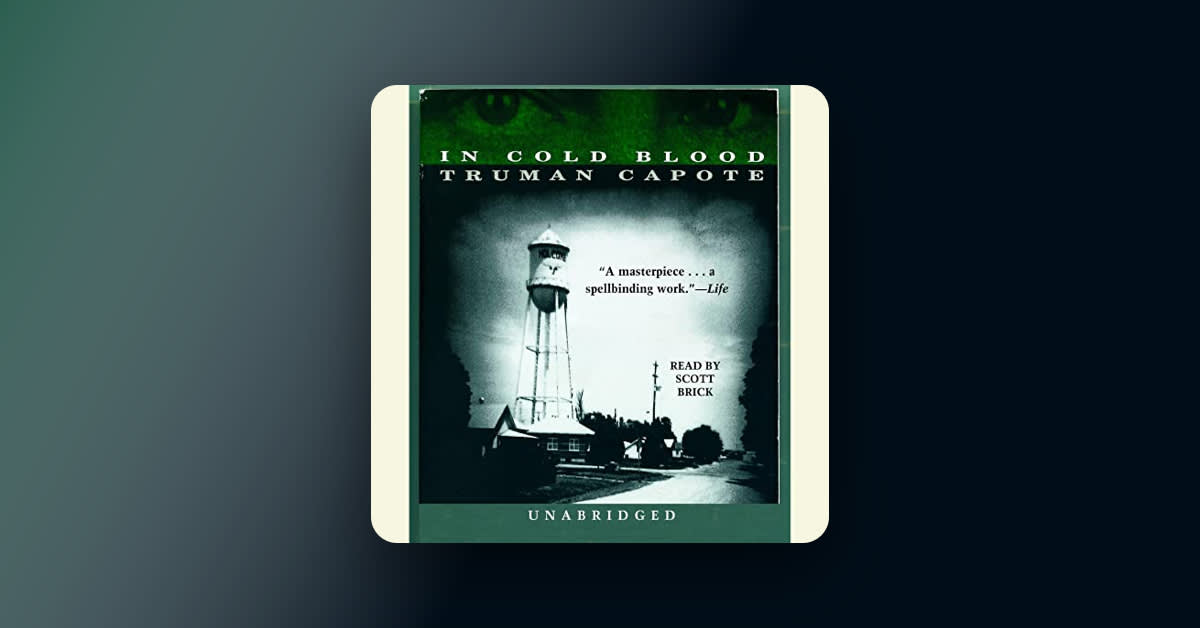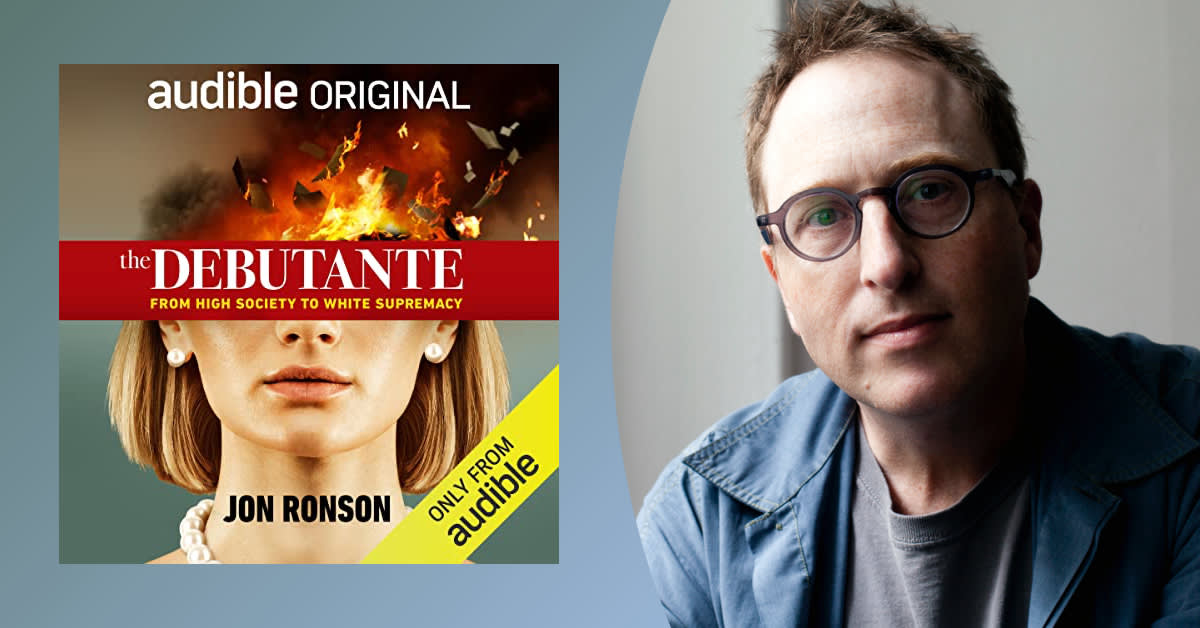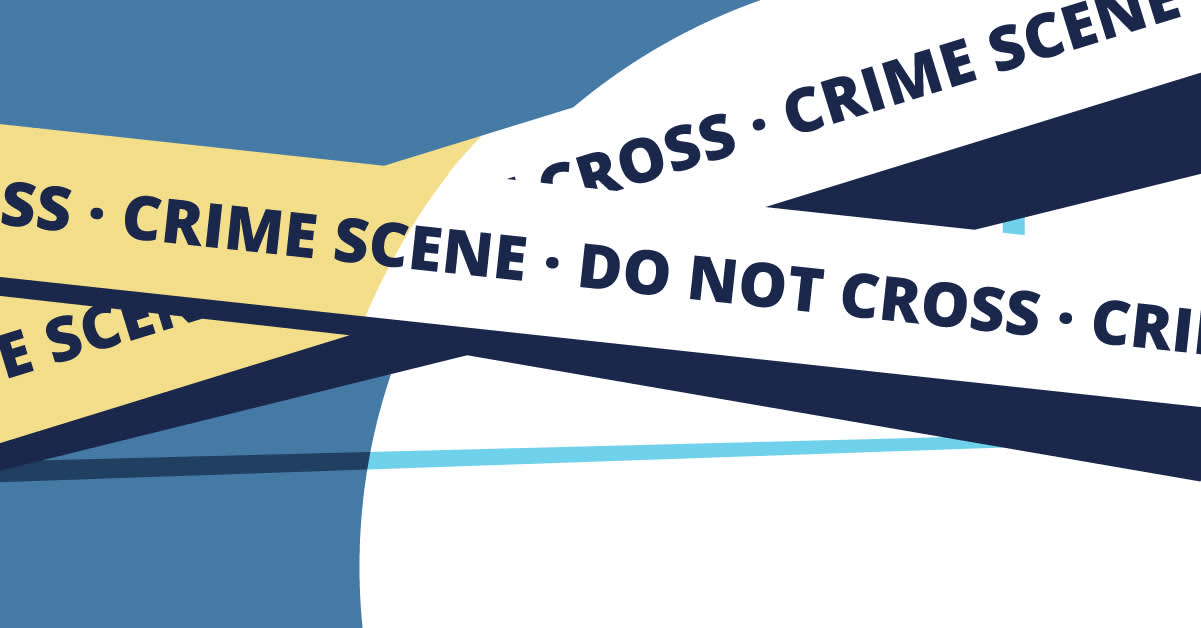Why it’s essential
Truman Capote birthed a genre with his true crime masterpiece about a rural Kansas murder. Hall of Fame narrator Scott Brick’s recording is equally timeless and chilling.
Featured in The Audible Essentials Top 100.
What is In Cold Blood about?
Truman Capote’s true crime classic centers on the 1959 Clutter family murders, in which prominent farmer Herb Clutter, his wife Bonnie, and teenage children Nancy and Kenyon were found shot to death in their Kansas home. Meticulously researched and unforgettably written, In Cold Blood explores every angle of the case, from the grisly slayings and their effects on the local community to the psychology, trial, and execution of the perpetrators, Perry Smith and Dick Hickock.
Editor's review
Editor Kat loves anything with shades of horror—from true crime and dark history to existential fiction and actual horror-horror—especially when it manages to sneak in some comic relief along the way.
In Cold Blood was the first true crime book I ever read, and after that, the bar was set. I was a junior in high school and a massive bookworm, though until then I’d read almost exclusively fiction, usually of the Great American Novel variety. For all I knew when I first picked it up, at a thrift shop or take-one/leave-one library where I hunted down cheap books, it WAS fiction, such was the towering reputation of Truman Capote and the breathless description of murder and Americana on the back cover.
Of course, as I now know full well, In Cold Blood is Capote’s 1966 masterpiece of narrative nonfiction—so rich in detail, dialogue, and character that it’s also called a “nonfiction novel”—and the crime it depicts was real, a media sensation in its day. Capote had already published a bestselling debut novel, Other Voices, Other Rooms (1948), and the triumphant novella Breakfast at Tiffany’s (1958) when he went to Holcomb, Kansas with his friend Harper Lee to report on the shocking murders of four members of the popular and prosperous Clutter family, inspired by little more than a brief New York Times article calling it “the case of a psychotic killer.” Armed with charm, confidence, and boundless ambition, Capote gained the locals’ trust and soon convinced all the key sources that his story was the one they had to be part of.
Capote was right. Like Serial a half-century later, In Cold Blood ushered in a new kind of true crime storytelling, one that centered both journalistic excellence and the narrative art of fiction. Showcasing Capote’s immaculate prose and intimate access to those involved (particularly convicted killer Perry Smith), the book was an instant success whose reputation has only grown. From its frightening description of the murders—the lonely Clutter farmhouse and open Kansas plain scare me to bits even without the quadruple homicide, thank you—to Capote’s authenticity-soaked regionalisms and atmosphere, In Cold Blood is an entire world as seen through the lens of a crime: the random, senseless violence; the hyper-nuanced portraits of the victims and killers, who lives might have turned out some other way, any other way; the peculiar celebrity of murder; the slow machinations of justice and the horror of death row.
I will never forget that first time reading it, which transported me from my dorm room in Rhode Island to a Kansas farmhouse, then to a claustrophobic prison cell. More recently I discovered the audio version, a legend in its own right thanks to narrator Scott Brick’s pitch-perfect performance, which seamlessly marries Capote’s haunting authorial voice with homespun prairie-isms (I lost count of all the "I don’t rightly know"s). With chilling precision and palpable respect for the material, Brick captivates as the tale gathers momentum. Depending on where you are when you listen, his performance might even be too immersive for comfort.
In the Audible Original Murder, We Spoke, Brick relates the story of a New York Times reporter who listened to state-specific audiobooks while she was on the road covering Hillary Clinton’s 2016 presidential campaign. While immersed in In Cold Blood, the reporter had to stop for fuel very late in the evening. “She pulled into the gas station and looked across the field at what she swore was the Clutter farm, all lit up in the moonlight,” Brick says. “And she was so terrified by the book that she found it extremely difficult to actually get out of her car and gas up.”
As reliably as it scares us, In Cold Blood remains a consistent influence on the nonfiction landscape. The journalist Jon Ronson told me how Capote's early confidence in the book reminded him to treat his own work with ambition, an approach that shines through in Ronson's scrupulously reported podcast, The Debutante. “I was inspired by Truman Capote to forget about writing a story really quickly and it's going in the paper the next day and it's a scoop,” he says. “Forget about that. What's great is to do something that's going to live for decades.”
Marcus Parks, cohost of the long-running Last Podcast on the Left, one of the most rigorously researched shows in true crime, has called In Cold Blood his biggest inspiration. Speaking about the book for Murder, We Spoke, Parks describes it as “the gold standard”—the book that got him into true crime and taught him everything he knows about the genre.
“I go back to it again and again,” Parks says, “just to kind of remind myself that this is how it's done. This is how you do it: you show everything. You do not shy away from anything at all. You show the entire lives of the victims, you show the entire lives of the perpetrators. And you know, for me, that’s the top.”
True crime conveys truths about the world that can be hard to hear. But in Capote’s telling and Brick’s performance, In Cold Blood beats with beauty, humanity, and propulsive storytelling to keep us listening through the darkness and through the decades.
Did you know?
Truman Capote’s childhood friend Harper Lee served as his “assistant researchist,” traveling with him to Holcomb, Kansas to investigate the Clutter murders while awaiting the publishing of To Kill a Mockingbird.
In Cold Blood is the #2 bestselling true-crime book in history, behind only Vincent Bugliosi’s Helter Skelter, which is also performed in audio by acclaimed narrator Scott Brick.
The Academy Award-nominated 1967 film adaptation of In Cold Blood stars Robert Blake, later accused of killing his wife, as murderer Perry Smith.
In Cold Blood is one of the most famous examples of the “nonfiction novel,” a subgenre Capote said should avoid first-person narration or any mention of the author themselves.
What listeners said
"This is the book that started the 'true crime' novel genre, and it is still the best example. The writing is crisp and current. The insight into the minds of the killers, as well as the victims and the townfolk, is nothing short of astonishing. Scott Brick was the perfect choice for narrating this work. The performance is understated, just like the prose. Listen twice, because you'll miss stuff and because it's worth it." —Lisa, Audible listener
"Despite being written over 40 years ago, In Cold Blood is just as compelling as any modern tale of murder. Truman Capote brilliantly captures the very essence of everyone involved in the brutal crime, weaving all the pieces together into a truly riveting tale. Scott Brick (whose work I adored in Under the Banner of Heaven) does a superb job narrating and affecting different accents and tones of the characters. Despite having read the text several times in the past, I found myself compelled to continue to listen to the audio version nonstop over approx. 3 days. Fantastic for any fan of true crime or great American literature." —Anonymous Audible listener
"This incredibly well-produced and narrated audio version of a literary masterpiece is going into my top 10. The story is gruesome and attention-grabbing but the real beauty is in the exploration of every person involved, as well as all of the events leading up to, and following the crime. This one had me riveted enough to leave the TV off for just a little bit longer so I could finish listening to one more chapter—that is extremely rare for me. My opinion is 5 stars without a doubt." —Kim, Audible listener
Quotes from In Cold Blood
“I thought that Mr. Clutter was a very nice gentleman. I thought so right up to the moment that I cut his throat.”
“I believe in hanging. Just so long as I'm not the one being hanged.”
“Imagination, of course, can open any door—turn the key and let terror walk right in.”
Podcast episodes about In Cold Blood
Murder Metal Mayhem, episode 145: The Clutter Murders, “In Cold Blood”
Most Notorious, episode 158: The "In Cold Blood" Clutter Murders with Gary McAvoy
House of Words, episode 1: “In Cold Blood” by Truman Capote
Listeners also love
About the author
Truman Capote was born in New Orleans in 1925 and raised in various parts of the south, his family spending winters in New Orleans and summers in Alabama and Georgia. By the age of 14, he had already started writing short stories, some of which were published. He left school when he was 15 and subsequently worked for The New Yorker which provided his first—and last—regular job. Following his spell with The New Yorker, Capote spent two years on a Louisiana farm where he wrote Other Voices, Other Rooms (1948). He lived, at one time or another, in Greece, Italy, Africa, and the West Indies, and travelled in Russia and the Orient. He is the author of many highly praised books, including A Tree of Night and Other Stories (1949); The Grass Harp (1951); Breakfast at Tiffany's (1958); In Cold Blood (1965), which immediately became the center of a storm of controversy on its publication; Music for Chameleons (1980); and Answered Prayers (1986). Truman Capote died in August 1984.
About the performer
Scott Brick's accessible, popular, and often relatable voice invites you into the story and takes you along for the ride. That ride can be in any number of genres, from nonfiction to sci-fi, fantasy, mystery, or suspense. Some of his big early splashes were with Nelson DeMille’s The Lion’s Game, Ron Chernow’s Alexander Hamilton, Frank Herbert’s Dune, and Orson Scott Card’s Ender’s Game series. He’s won numerous Audie Awards, including two in 2016 for his performances of Jurassic Park and The Patriot Threat. His many other lauded performances include John Grisham's The Firm, Tom Clancy's The Hunt for Red October, Erik Larson's The Devil in the White City, Jon Krakauer's Under the Banner of Heaven, and Philip K. Dick's Blade Runner.
















